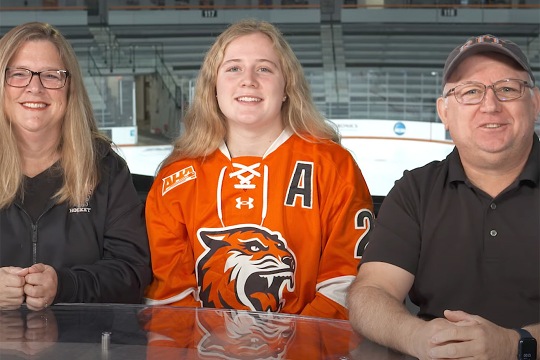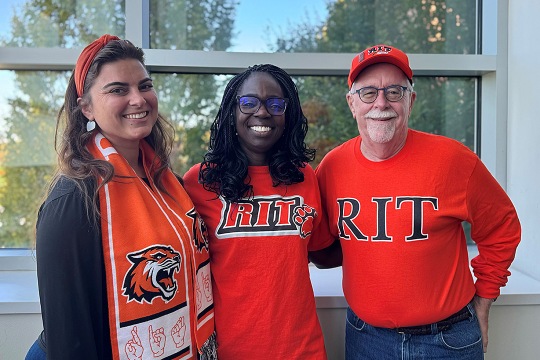NTID AlumniNews
Deaf in STEM Conference highlighted RIT/NTID alumni and professionals in STEM fields

Kayley Judd, an RIT/NTID student majoring in mechanical engineering technology, led the Deaf in STEM Conference last month, inviting deaf and hard-of-hearing alumni and professionals to the RIT campus to present on various STEM topics. This student-led conference was a tremendous success, drawing more than 100 attendees, including students, faculty, staff, volunteers, and walk-ins.
 The main focus of the Deaf in STEM Conference was to bridge the gap between deaf and hard-of-hearing students and professionals in the working world. With a strong focus on diversity, equity, and inclusion, this conference highlighted the stories and experiences of deaf and hard-of-hearing STEM professionals.
The main focus of the Deaf in STEM Conference was to bridge the gap between deaf and hard-of-hearing students and professionals in the working world. With a strong focus on diversity, equity, and inclusion, this conference highlighted the stories and experiences of deaf and hard-of-hearing STEM professionals.
While STEM careers are some of the fastest-growing employment sectors, Judd was shocked to learn that opportunities for deaf and hard-of-hearing students to attend STEM conferences were limited and accessibility was not always available at the conferences.
“When I transferred to RIT/NTID, I was excited about the opportunities this institute had to offer, as well as growth as an individual, personally and professionally,” said Judd. “During my first semester, I was looking for opportunities to attend conferences to grow my network. However, I was shocked to see the limited opportunities for our deaf and hard-of-hearing students to attend conferences. It’s expensive to travel and attend the few conferences I could find. Not to mention the fact that accessibility is not always available at these conferences.”
A study conducted by the National Science Foundation found that only three percent of people with disabilities are in the STEM workforce. This finding prompted Judd to eagerly organize the conference on campus for students and other attendees to connect with STEM alumni and professionals, while exploring essential soft skills, such as networking, self-advocacy, leadership, and more.
Over the two-day event, a total of 11 alumni and professionals participated in interactive workshops and discussed various topics, perspectives, and insights about STEM. In addition to engaging workshops, the conference featured a Q&A panel with alumni, faculty, and staff to share their diverse journeys in STEM fields.
Faculty, staff, and students also had the opportunity to interact, connect, and network with alumni and professionals at a “STEM Supper: Networking and Innovation.” Following the event, attendees departed the conference feeling empowered, educated, and inspired.
 “There are many reasons why it was crucial to me and for the conference to be successful,” Judd explained. “One of the main reasons I pushed for and started this conference was to give students opportunities to expand and grow more than just academics.”
“There are many reasons why it was crucial to me and for the conference to be successful,” Judd explained. “One of the main reasons I pushed for and started this conference was to give students opportunities to expand and grow more than just academics.”
Judd hopes that students or aspiring STEM professionals gain from this conference not just the growth in knowledge about the different areas of STEM that alumni and professionals presented, but growth in themselves as students as well as growth in their network and support system. She also hopes that this conference will become an annual event.
The Deaf in STEM conference was made possible through the support of its planning committees, the NTID Regional STEM Center, Deaf Hub, WE@RIT, Center on Access Technology, and N.E.R.D. Girls in STEM.





